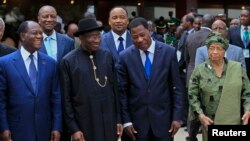The president of the Economic Community of West African States (ECOWAS) says the regional bloc is working with its international partners, other stakeholders, and Mali’s government to ensure a successful July 28 presidential election in Mali.
Ambassador Kadre Desire Ouedraogo says ECOWAS is committed to help Mali conduct a peaceful and credible election.
Ouedraogo’s remarks came during a two-day regional leaders summit that reviewed the political and security situation in Mali. The meeting ends on Thursday.
Mamadou Diamountani, chairman of Mali’s electoral commission, has said that carrying out a successful election will be challenging.
But, Ouedraogo says the regional bloc is working with the electoral commission to ensure the vote goes ahead.
“ECOWAS has committed itself to assist the Malian government and people in succeeding in their transition,” Ouedraogo said. “This is the reason why we have participated in the stabilization of Mali by sending 6,300 troops on the ground. I believe that thanks to the intervention of those troops from France and Chad … we are able to expel the terrorist groups from the north of the country.
Last month, Burkinabe President Blaise Compaore mediated talks that led to a signed agreement between Mali’s government and the Tuareg rebels.
The deal opened the way for this month’s scheduled vote and for the army to return to the rebel-held city of Kidal.
Regional experts say ECOWAS played a key role in the formation of Mali’s transitional government. ECOWAS officials have often said the regional group seeks Mali’s territorial integrity and its quick return to constitutional rule.
“We are happy that the last obstacle leading to the organization of transparent election throughout the country was removed by the recent agreement signed in Ouagadougou between the central government and the armed groups in the north, and I think the road is open now to organize the elections” said Ouedraogo.
Despite that optimism, some Malians have expressed skepticism about the agreement, saying that parts of the country are still not safe enough to carry out a peaceful election. Ouedraogo disagreed.
“The country is now peaceful, and we are going to continue our support for the stabilization of the northern parts of the country,” said Ouedraogo. “ECOWAS will be by the side of the government of Mali in order to succeed in this incoming election.”
He says his group has dispatched a team of poll observers to monitor the vote.
“ECOWAS has already sent an electoral mission to Mali to discuss with all the stakeholders and make sure that all the measures have been taken to ensure a free and fair election,” said Ouedraogo. “In addition, we are prepared to send on the ground more than 250 observers that will go and observe this election. We are ready to assist financially and also technically, the national electoral commission.”
Ambassador Kadre Desire Ouedraogo says ECOWAS is committed to help Mali conduct a peaceful and credible election.
Ouedraogo’s remarks came during a two-day regional leaders summit that reviewed the political and security situation in Mali. The meeting ends on Thursday.
Mamadou Diamountani, chairman of Mali’s electoral commission, has said that carrying out a successful election will be challenging.
But, Ouedraogo says the regional bloc is working with the electoral commission to ensure the vote goes ahead.
“ECOWAS has committed itself to assist the Malian government and people in succeeding in their transition,” Ouedraogo said. “This is the reason why we have participated in the stabilization of Mali by sending 6,300 troops on the ground. I believe that thanks to the intervention of those troops from France and Chad … we are able to expel the terrorist groups from the north of the country.
Last month, Burkinabe President Blaise Compaore mediated talks that led to a signed agreement between Mali’s government and the Tuareg rebels.
The deal opened the way for this month’s scheduled vote and for the army to return to the rebel-held city of Kidal.
Regional experts say ECOWAS played a key role in the formation of Mali’s transitional government. ECOWAS officials have often said the regional group seeks Mali’s territorial integrity and its quick return to constitutional rule.
“We are happy that the last obstacle leading to the organization of transparent election throughout the country was removed by the recent agreement signed in Ouagadougou between the central government and the armed groups in the north, and I think the road is open now to organize the elections” said Ouedraogo.
Despite that optimism, some Malians have expressed skepticism about the agreement, saying that parts of the country are still not safe enough to carry out a peaceful election. Ouedraogo disagreed.
“The country is now peaceful, and we are going to continue our support for the stabilization of the northern parts of the country,” said Ouedraogo. “ECOWAS will be by the side of the government of Mali in order to succeed in this incoming election.”
He says his group has dispatched a team of poll observers to monitor the vote.
“ECOWAS has already sent an electoral mission to Mali to discuss with all the stakeholders and make sure that all the measures have been taken to ensure a free and fair election,” said Ouedraogo. “In addition, we are prepared to send on the ground more than 250 observers that will go and observe this election. We are ready to assist financially and also technically, the national electoral commission.”





